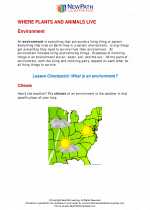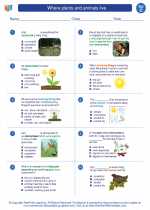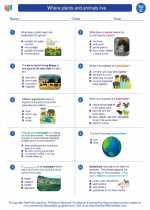Mutualism
Mutualism is a type of symbiotic relationship between two organisms in which both organisms benefit from the association. This type of relationship is common in nature and can occur between organisms of different species.
Examples of Mutualism
- Pollination: Bees and flowers have a mutualistic relationship. Bees obtain nectar from the flowers, and in the process, they transfer pollen from one flower to another, aiding in the plant's reproduction.
- Ants and Aphids: Ants protect aphids from predators and in return, the aphids secrete a sugary substance that the ants feed on.
- Human Gut Flora: Humans and the bacteria in our gut have a mutualistic relationship. The bacteria aid in digestion and, in turn, receive nutrients from the human body.
Study Guide for Mutualism
Definition:
Mutualism is a symbiotic relationship between two organisms in which both organisms benefit from the association.
Characteristics of Mutualism:
- Both organisms benefit from the relationship
- The relationship can be obligatory, where the organisms cannot survive without each other, or facultative, where they can survive independently
- Mutualism can occur between organisms of different species
Examples of Mutualism:
Choose three examples of mutualistic relationships in nature and describe the benefits that each organism receives from the relationship.
Importance of Mutualism:
Explain the significance of mutualism in maintaining ecological balance and the interconnectedness of species in an ecosystem.
Human Impact on Mutualistic Relationships:
Discuss how human activities such as deforestation, pollution, and habitat destruction can disrupt mutualistic relationships in nature and the potential consequences of these disruptions.
By understanding mutualism and its role in ecosystems, we can appreciate the interconnectedness of all living organisms and the importance of maintaining these symbiotic relationships for the health of our planet.
[Mutualism] Related Worksheets and Study Guides:
.◂Science Worksheets and Study Guides Third Grade. Where plants and animals live

 Worksheet/Answer key
Worksheet/Answer key
 Worksheet/Answer key
Worksheet/Answer key
 Worksheet/Answer key
Worksheet/Answer key
 Vocabulary/Answer key
Vocabulary/Answer key
 Vocabulary/Answer key
Vocabulary/Answer key
